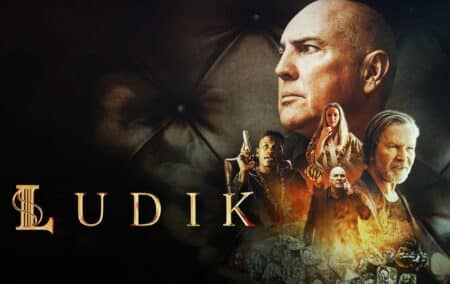Warning: This movie review contains swearwords and Afrikaans, often indistinguishable from each other.
The dominee walks out of church (1979), fresh from a sermon and tells a congregant: ‘Jy is ‘n fokken doos. Ek sal jou dood bliksem.’ (You are an asshole. I’ll beat you up.) The man had just told the preacher that his wife was probably having extra-marital sex while he was preaching.
And I thought: ‘Yup, these are my people.’
Ludik is the first Afrikaans series streamed by Netflix. You can watch it with subtitles across the globe. I was surprised at the varied, conflicting, joyful reactions I had while watching it. The show features a type of Afrikaner, and a style of Afrikaans that I had forgotten was part of me and our lived history – gritty, flawed, authentic and marinaded in brandy.
The use of the vernacular is raw and rude and true. It is a ‘fok jou’ hier en ‘n ‘moer jou’ daar and a white, black and same-sex genaaiery, all together, deurmekaar.
Violence is the 12th official language. It is a punctuation mark; as everyone knows, non-verbal communication works best.
Perhaps no other phrase typifies the Afrikaner as concisely as ‘fok jou.’ Its efficiency and straightforwardness make it a much more appropriate epithet than ‘uit die blou van onse hemel’. It is equally helpful as a linguistic middle finger, a friendly pat on the back or a slap in the face.
It could be uttered as a defiant mumble while you skip a red robot. Or said with a jousting smile when your friend mentions how sophisticated you look with your new dad bod and extra grey hair. It could also be an ominous foreboding of dire physical retribution, as Swys warned assailants after they thrashed him. Unfortunately, you might not know which one it is until it is too late.
It is an attitude reverberating through the centuries:
1838: ‘Rooinek! Ons fokof nou, voort en Noord, kaalvoet oor die Drakensberge en begin ons eie provinsie.’
(The early Boers embark on a Great Trek to the North, fiercely seeking independence from British colonial rule.)
1948: ‘Hierdie keer, vat sommer die hele land oor. Dis fokol vir ons.’
(The Afrikaner Nationalist Party becomes the ruling party and legislates a system of segregationist policies called ‘Apartheid’ typified by a Calvinistic Christian culture.)
1994: ‘Waddefok? Nee, hokaai, ouens! Ons moet saamwerk hierso. Bygones, ouens, bygones!’
(South Africa holds its first democratic elections. The NP is voted out and replaced by the ANC. Most Afrikaners assimilate into a new rainbow nation. The language survives by unique evolutions in different community groups.)
I thought Ludik, as the first Afrikaans Netflix series, did well in presenting an integrated sub-culture. It steers clear of the trap of labouring themes such as racial tension and same-sex relationships, any of which might have given Haas Das the horries and tripped up less astute filmmakers. The producers also followed a different route to market. Traditionally, a Netflix series is produced by Netflix, which means the platform finances the production and backs it up with its editorial guidance and support. Ludik was created on a small budget, at its own risk, and then licensed to the streaming service or anyone else who wants to buy. Willing buyer, willing seller. Culture on demand. Fokkit, ons doen dit self. It is the free market in action,
I am reminded of something Leon Louw told me 20 years ago. ‘When Apartheid ended, the group most liberated by its dismantling were not “the blacks”, but the Afrikaner.’ Louw was co-founder of the Free Market Foundation. His incisive articulation on these topics was highly acclaimed worldwide, yet the idea was startling to me. I was still conflicted as to how I felt about being a Boer. Many of us, including some liberals, felt something had been taken away from us, not given unto us, as Louw had implied. I experienced shame, guilt, pride, anger, fear, relief, and hope, all bubbling simultaneously. I thought Louw might have been mocking me, but the man is part Boer himself, so I allowed the thought to percolate.
It remains a profound statement. Freedom allows you to be yourself – and for others to reject you. It is not safe. Or easy. You must find your own way. Freedom is not for sissies. And Afrikaners have never been sissies.
As the main character (Dean Ludik), Arnold Vosloo is comfortable in his first language and the role of a successful businessman with a dodgy legacy. It hardly feels like watching acting at all. He swears and skops and donners with the rest of them. It is hard to fathom that he speaks the same language as the one that made its highly puritan television debut in 1976 as sanctioned by the state broadcaster. From Wielie Walie to ‘Fok Jou Internasionaal’, just like that.
Swys (Rob van Vuuren) steals the show, though, it looks like. He gets kicked out, thumped and trounced by thugs of various nationalities. But, as fractured, blemished and alcohol-plagued as he is, he somehow finds a degree of redemption and acceptance in the group. That might be as lucky and blessed as one gets in life. And that is a much more valuable lesson than Bennie Boekwurm ever taught me.
If you want an analysis of the technical and dramatic elements of Ludik, there are many great ones on the internet. Some say it was good. Others say it was terrible. Pick any one you want – or all of them. You have a free choice here.
This was merely a review of how I felt while watching it. It felt great! I thoroughly enjoyed it.
Viva.
The views of the writer are not necessarily the views of the Daily Friend or the IRR
If you like what you have just read, support the Daily Friend

